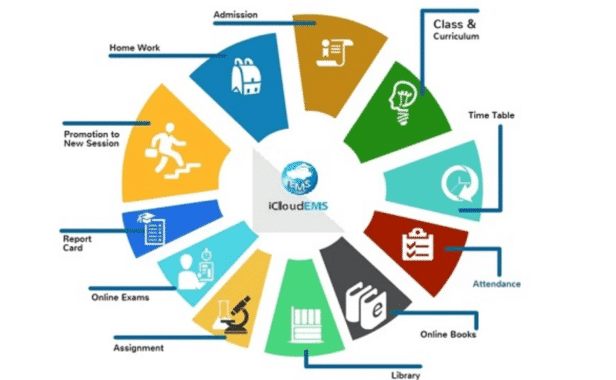Education ERP Solutions: Transforming the Academic Landscape – In today’s fast-evolving academic environment, educational institutions face challenges that go beyond traditional teaching and learning. Administrative burdens, student management, financial tracking, and regulatory compliance are just some of the daily hurdles. To address these complexities, many educational institutions are turning to Education ERP solutions (Enterprise Resource Planning) as a comprehensive tool for managing their operations. Education ERP solutions integrate various functions such as student information systems, finance, human resources, and academic management into a single, unified platform, making it easier to streamline processes and deliver a higher quality of education.

What are Education ERP Solutions?
Education ERP solutions are specialized software systems designed to manage and integrate the various operations and processes within an educational institution. These solutions help automate administrative tasks, improve communication, manage resources effectively, and provide data-driven insights for decision-making. By consolidating multiple functions into one system, Education ERP solutions eliminate the need for disparate software applications, enabling educational institutions to work more efficiently.
The system typically encompasses a wide range of modules tailored to the needs of educational institutions, such as admissions management, attendance tracking, course management, grading, library management, finance and accounting, and human resource management. With real-time access to information and automated workflows, Education ERP solutions help institutions make better decisions, enhance student outcomes, and optimize resource allocation.
Key Features of Education ERP Solutions
Education ERP solutions are equipped with a variety of features specifically designed to address the unique needs of educational institutions:
- Student Information System (SIS)
A core component of Education ERP solutions is the Student Information System, which manages all aspects of student data. This includes enrollment, course registrations, attendance tracking, grades, and disciplinary records. By centralizing student information, institutions can ensure data accuracy, provide timely access to student records, and support better academic planning. - Admissions and Enrollment Management
The ERP system streamlines the entire admissions process, from online applications to document submission and fee payment. Automated workflows help admissions staff manage application reviews, communicate with applicants, and make data-driven decisions regarding admissions. This reduces manual tasks and shortens the time required to process applications. - Academic Management
Education ERP solutions support the management of academic programs, courses, timetables, and faculty assignments. The system helps in planning and scheduling classes, tracking curriculum progress, and maintaining accurate records of course offerings. This feature ensures that academic operations run smoothly and efficiently. - Finance and Accounting
The financial management module handles budgeting, accounting, payroll, fee collection, and financial reporting. By integrating financial processes, the system ensures accurate financial data, timely fee payments, and compliance with regulatory standards. This enables institutions to monitor their financial health and optimize resource allocation. - Human Resources Management
Managing faculty and staff is an essential part of educational administration. The ERP system helps automate HR functions such as payroll, recruitment, performance evaluations, leave management, and training. By managing employee records and processes in a centralized system, institutions can ensure compliance with employment regulations and maintain a productive workforce. - Library and Resource Management
Education ERP solutions often include a module for library management, which allows institutions to catalog books, track loans, manage subscriptions, and oversee resource utilization. This module supports the seamless integration of the library with the rest of the institution’s systems, making it easier for students and faculty to access library resources. - Communication and Collaboration Tools
The ERP system includes features for communication between students, faculty, staff, and parents. This may involve portals or mobile applications that facilitate information sharing, announcements, event management, and parent-teacher communication. Such tools improve transparency and foster a sense of community within the institution. - Analytics and Reporting
Education ERP solutions come equipped with powerful analytics and reporting tools that help institutions generate reports on various metrics, such as student performance, financial status, and resource utilization. Data-driven insights can be used to improve academic programs, optimize resource allocation, and make informed strategic decisions.
Benefits of Implementing Education ERP Solutions
Implementing Education ERP solutions offers several benefits that help educational institutions address challenges and improve overall efficiency:
- Streamlined Administrative Processes
Education ERP solutions automate many administrative tasks, such as fee collection, admissions processing, and attendance tracking. This reduces the workload on administrative staff and minimizes the chances of human error. Automation also ensures that tasks are completed quickly and accurately, allowing staff to focus on more critical activities. - Improved Data Accuracy and Accessibility
Centralizing data in a single ERP system ensures consistency across departments and eliminates the need for manual data entry into multiple systems. With all information stored in one place, staff can access accurate and up-to-date data whenever needed. This improves decision-making and enables quick responses to issues. - Enhanced Student and Academic Outcomes
By providing real-time access to student information and academic progress, Education ERP solutions help faculty members track student performance more effectively. Early identification of students who may need additional support allows for timely interventions, which can lead to better academic outcomes. Additionally, tools for managing course schedules, assignments, and assessments help ensure a well-organized learning environment. - Cost Savings and Resource Optimization
Education ERP solutions enable institutions to reduce costs associated with manual processes, paper-based systems, and redundant software applications. Automation of tasks such as payroll, fee processing, and inventory management reduces administrative costs. Moreover, insights derived from data analytics can help institutions optimize the use of resources such as classrooms, faculty time, and budgets. - Compliance and Regulatory Adherence
Educational institutions must comply with various regulations, such as accreditation standards and government reporting requirements. Education ERP solutions facilitate compliance by maintaining accurate records, automating reporting processes, and ensuring that data management practices align with regulatory standards. This reduces the risk of penalties associated with non-compliance. - Improved Communication and Collaboration
By providing platforms for communication between students, faculty, staff, and parents, Education ERP solutions promote a collaborative environment. Information can be easily shared, announcements can be made instantly, and feedback can be provided through dedicated portals. This improves transparency and fosters a stronger sense of community within the institution.
Challenges in Implementing Education ERP Solutions
While the benefits are clear, there are also challenges associated with implementing Education ERP solutions:
- High Initial Investment
The cost of implementing an Education ERP system can be significant, particularly for smaller institutions. This includes expenses related to software licensing, hardware upgrades, data migration, and staff training. Although the system may offer long-term savings, the initial investment can be a barrier for some institutions. - Complexity in Customization and Integration
Educational institutions often have unique requirements that necessitate the customization of the ERP system. Additionally, integrating the ERP system with existing tools and databases can be complex, particularly if legacy systems are outdated or lack compatibility with modern software. Customization and integration can increase implementation costs and extend the timeline. - Data Migration and System Transition
Transferring data from legacy systems to a new ERP platform requires careful planning to ensure data accuracy and integrity. Incomplete or poorly executed data migration can lead to operational disruptions. Institutions must ensure that data is cleaned and validated before the transition to avoid issues. - Employee Training and Change Management
Adopting a new Education ERP system requires staff and faculty to learn how to use the new platform effectively. Without adequate training, users may struggle with the system, resulting in poor utilization and resistance to change. Comprehensive training programs and effective change management strategies are essential to ensure a smooth transition.
The Future of Education ERP Solutions
As educational institutions continue to embrace digital transformation, Education ERP solutions are evolving to meet new demands. Some key future trends include:
- Cloud-Based ERP Solutions
Cloud-based ERP systems are gaining popularity due to their flexibility, scalability, and cost-effectiveness. Institutions can access the system from anywhere, facilitate remote learning, and reduce the need for expensive on-premise infrastructure. Cloud solutions also offer regular updates and better data security. - Artificial Intelligence (AI) and Machine Learning (ML)
AI and ML are being integrated into Education ERP solutions to enhance functionalities such as predictive analytics, personalized learning, and automated administrative tasks. For example, AI can help predict student performance, identify at-risk students, and recommend interventions. These technologies enable institutions to make proactive and data-driven decisions. - Internet of Things (IoT) Integration
IoT devices, such as smart ID cards, can be integrated with Education ERP systems to monitor attendance, track resource usage, and enhance campus security. IoT integration provides real-time data that can be used for efficient campus management. - Focus on Student-Centric Learning
As the focus shifts towards personalized learning experiences, Education ERP solutions are incorporating features that support student-centric education models. This includes tools for adaptive learning, individualized progress tracking, and learning path customization. Enhancing the learning experience through ERP systems can lead to better student engagement and outcomes.
Conclusion
Education ERP solutions are transforming the academic landscape by providing institutions with the tools they need to streamline operations, improve resource management, and enhance student outcomes. While challenges in implementation exist, the benefits of improved efficiency, data accuracy, and cost savings make ERP systems a valuable investment. As technology continues to evolve, Education ERP solutions will play a crucial role in shaping the future of education, enabling institutions to meet the changing needs of students and educators.

